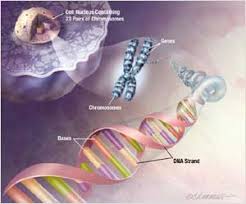
Which can be summarised as:
"ADHD Genetic Faults Link – One child in 50 is suffering from ‘attention deficit disorder with hyperactivity (ADHD), a problem whose causes are not well established and could be partially of genetic origin, according to a study released this week.
This condition, which leads to fidgeting, inattention, difficulty concentrating, impulsiveness, causing problems at school and affects more boys than girls. Symptoms appear within the first year of life.
The reasons advanced are varied: lax parents, food too sweet, biochemical disorders on neurotransmitters.
Genetic causes, are also mentioned since the risk that the child is hyperactive is increased if a parent is and that if an identical twin is hyperactive, the other has 75% chance of being well. A study published by the British journal Lancet shows for the first time direct evidence that goes in that direction.
Researchers led by Anita Thapar, Professor of Genetics at Cardiff University (Wales), compared the DNA of 366 children with hyperactivity and that of 1047 did not suffer. They then found that hyperactive children were more likely to have in their genome into small fragments of DNA double or absent.
These fragments, variations of copies of a gene, or CNV-role control valve on genes, their absence or duplication may alter gene expression.
They also found that these fragments were found in locations such as chromosome 16, which are involved in schizophrenia and autism, a disease that has some similarities with hyperactivity, such as difficulty in learning.
For researchers, one can imagine a biological basis common to both diseases.
“This is the first time we’ve found that children with ADHD have chunks of DNA that are either duplicated or missing,” explained Anita Thapar."
So we have a possible link between DNA oddities and ADHD that has evidence of positive correlation between both. But the article is keen to point out the following:
“Hyperactivity is not caused by a single genetic change, but probably several, including CNV, interaction with unidentified environmental factors,” said another researcher, Kate Langley."
This article has had a fair amount of coverage. ADHD is of course a concern for many parents so that isn't quite unexpected. It is also a controversial issue as there are those who believe ADHD is little more than a fictional disorder designed to exonerate bad parenting and just put a fancy label on naughty kids. But if the link has validity then this does raise interesting questions, and I do think it could (if there is a definite causal link) have a profound effect on societies thinking on both how disruptive individuals should be treated, and indeed our current consensus on ethics and understanding of human nature and the innate sense of good and bad humans have.
The potential consequences of discovering that the composition of the genome may be a dominating factor in the makeup of a persons character would throw our established notions of behaviour and the way we deal with "antisocial" traits quite literally out of the window. It is generally believed that a person, say a naughty child or a thuggish hoodie or a criminal deviant has chosen to be like that. They have decided to rebel from society. To not play by the rules. They are misguided at best, at worst downright evil. Parental issues and the person in questions background do generally come next in line in common consensus reasons for [negatively sanctioned] deviancy and antisocial behaviour. Our laws, both civil; workplace and school, criminal trials and general societal sensibilities reflect this. Diminished responsibility of course can be taken into account, but most trials assume at least some form of sound mind and active; freewill motivated cause of antisocial behaviour, and who is to say that at present that is our best understanding of how to deal with this sort of thing? But if inherited genetics was proven to be a big (and possibly the biggest role) in creating disruptive and antisocial behaviour what then? No-one chooses their own genome, like some organic computer program. That would render our established method of dealing with this sort of thing - completely obsolete. We would have to move from away from pure or largely free will; motivated theories of individual behaviour to one of a high degree of genetic influences. That is why if you think about the potential conclusions that can lead from these findings - this story could be so groundbreaking to our society. And contentious too.
If, hypothetically speaking, genetics was found to be the prime motivator for human behaviour and "bad" behaviour in particular, then we would see society having a hard time accepting it as nothing more than "do-gooder" shrinks and scientists making excuses for bad behaviour. Right wing columnists would go to town claiming it was all down to bad parents and feral youth, not arbitrary genetics. A genetically based prime motivator would also be extremely controversial and hard for the main religions to swallow. I think it would be as controversial as creationism, and could possibly be the next science / religion battle ground. "Free will" and "soul" are trumpeted by evangelicals and others, the former in particular being used to get God off the hook in regards to bad stuff people do under his "perfect" watch. Neither of these sit well with genetic theories of behaviour, and this is partly why; say Mel Phillips and Peter Hitchens are so "hostile" to things like ADHD.
There would also be the issue of being able to screen genes of embryos to spot these "troubled" genes. This of course brings the inevitable ethical questions of potential programs of "eugenic terminations", and the results that would follow. In Stephen Baxter and Aurthur C Clark's novel "The Light of Other Days" the characters [set in the future] notice that there are fewer hard discipline scientists and musicians than there used to be, as things like Aspergers and Manic Depression had been screened out and "treated" at birth. Could "purging undesirable" traits become closer to reality? And where could it lead?
I'm not for one minute saying that genetics is the sole factor in determining someones behaviour. I don't think that (neither do the researchers in the article), other stuff influences it also. But have put a hypothetical situation that could distort our held beliefs in such a radical way. A smallish research study that could have enormous consequences down the road.

No comments:
Post a Comment